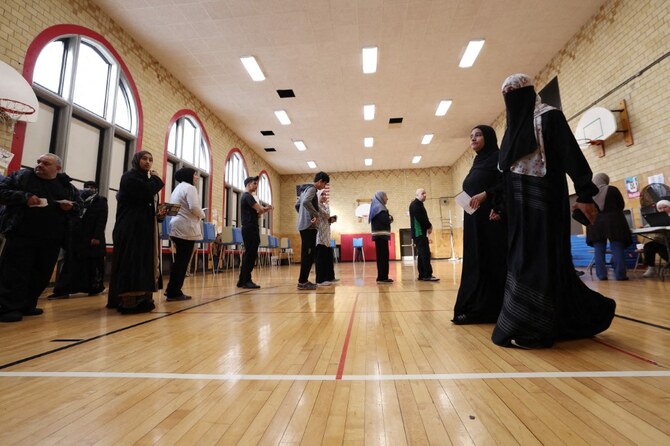CHICAGO: Alongside Donald Trump’s victory over Kamala Harris in the US presidential election on Tuesday, and amid ongoing tensions in Gaza, Lebanon and Iran, several Arab American incumbents won reelection to their offices at state and congressional levels, some of them unchallenged.
Four Arab American members of Congress will return to the Capitol to represent their districts in California, Illinois, Minnesota and Michigan, while five were reelected to State House seats in Illinois, Michigan, Colorado and Iowa.
In some places, however, there were allegations of Islamophobia and anti-Arab sentiment as opponents sought to capitalize on voter concerns about terrorism and foreign conflicts.
Suzanne Akhras, a Syrian American Democrat who lost to Republican incumbent Nicole La Ha in the race to represent the 82nd District in the Illinois House of Representatives, said she was targeted by anonymous text messages and phone calls falsely linking her to Islamic terrorism, including claims of ties to Hamas.
“These calls and texts tried to portray me as a danger to the community I love,” she said in a campaign video message to voters in September. “I have lived in Burr Ridge for nearly 20 years. I have been a PTA parent. I have spent my life advocating for vulnerable people and being of service. I founded a very successful non-profit organization.
"I am a proud American. I cherish our shared values of freedom; freedom to express our diverse faiths and freedom to celebrate the diversity of our backgrounds and cultures. Those freedoms I hold dear are under attack in our district. These attacks against me are based on racism, Islamophobia and are xenophobic.”
Akhras, who said she has been recognized as an “upstander” by the Illinois Holocaust Museum for confronting hate speech and crime, said the “disturbing calls and text messages” began shortly after she began campaigning door-to-door. She criticized the Republican Party in the state for failing to denounce the attacks, and accused La Ha of running an “abhorrent and dangerous, xenophobic” smear campaign.
Akhras, who wears a hijab and whose husband, Dr. Zaher Sahloul, helps provide humanitarian medical services to refugees and displaced people in conflict zones, including Gaza, also said that despite winning the Democratic primary in March, she received no support from the Illinois Democratic Party.
Elsewhere, Darrell Issa, who is of Syrian-Lebanese heritage, was reelected to Congress as the representative for California’s 48th district, defeating Democrat Stephen Houlahan with 60.2 percent of the vote.
In Minnesota, Democrat Ilhan Omar, who is of Somali descent, was reelected as the member of the House of Representatives for the 5th District with 75 percent of the vote, easily defeating her Republican rival, Arab American Dalia Al-Aqidi.
Democrat Rashida Tlaib, who is Palestinian American , defeated Republican James Hopper with 69.7 percent of the vote in Michigan’s 12th Congressional District. Republican Darin LaHood, who is of Lebanese heritage, ran unopposed in Illinois’ 16th District.
Two Arab American members of Congress, Democrat Anna Eshoo from California and Republican Garret Graves from Louisiana, did not seek reelection.
At the state level, Democrat Nabeela Syed, who is of Indian heritage, secured a second term in the State House as the representative for the 51st District with 55 percent of the vote, ahead of Republican rival Tosi Ufodike.
In Michigan’s 3rd District, Democrat Alabas Farhat defeated Republican Richard Zeile with 67.9 percent of the vote. Democrat Iman Jodeh was reelected in Colorado’s 41st District, gaining 61 percent of the vote against Republican Robert McKenna.
Palestinian American Abdelnasser Rashid and Syrian American Sami Scheetz, both Democrats, retained their seats without a challenge in Illinois’ 21st District and Iowa’s 78th District respectively.





















